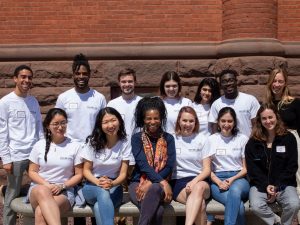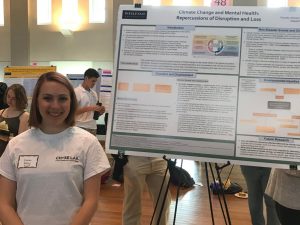 Assistant Professor of Psychology H. Shellae Versey, PhD and Emma Ritter ’19 launched a faculty-student research collaboration during the 2018-2019 academic year exploring Communities in Crisis: The impact of disasters on mental health. The research focused on environmental hazards—both natural and manmade—and the resulting effect on health and displacement among various communities. A COE faculty-student research a grant provided Versey and Ritter the opportunity to conduct research that would not have been otherwise possible.
Assistant Professor of Psychology H. Shellae Versey, PhD and Emma Ritter ’19 launched a faculty-student research collaboration during the 2018-2019 academic year exploring Communities in Crisis: The impact of disasters on mental health. The research focused on environmental hazards—both natural and manmade—and the resulting effect on health and displacement among various communities. A COE faculty-student research a grant provided Versey and Ritter the opportunity to conduct research that would not have been otherwise possible.
Tell us about your CH+SE Lab and the lab research supported by the College of the Environment’s Faculty-Student Research Program.
CH+SE stands for “Critical Health + Social Ecology” and represents the range of research our lab is engaged in. Recently, our lab has been thinking about types of displacement and the loss of place. This past year, Emma Ritter ’19 and I collaborated on a project exploring communities affected by environmentally induced displacement. Environmentally induced displacement (EID) is a broad term that describes a range of ways in which environmental hazards threaten people’s homes and livelihoods. From oil spills and mineral extraction to climate change, earthquakes, and urban development—they all introduce environmental disrupters that can affect how and where people live.

What did you hope to find in your research? Were there any surprises?
While we didn’t set out with many firm expectations, we did expect that mental health would be considered a critical part of environmental crisis plans and protocols, given the tremendous impact of environmental disasters on aspects of everyday life. However, we found that this wasn’t the case. Our review of the literature and research with clinical psychologists and community mental health providers suggests that there are few resources to help individuals process and recover from trauma and stress that may result from displacement.
Why is this work important, in your opinion?
Whether its urban displacement due to gentrification or environmentally induced displacement attributed to hurricanes and flooding, this work is important because displacement is a process that disproportionately affects marginalized groups—Black and Brown communities, indigenous communities, migrant communities, the poor, and women. Most affected groups are often vulnerable to begin with and already live in environmentally precarious contexts. Therefore, when some unexpected issue impacts their home and sense of belonging to a place, it can be stressful. In the long term, EID stress can become traumatic, particularly if you have limited means to pick up and start over. Yet there’s little research that investigates how psychologists and communities can best respond to and manage these challenges.
Our review of the literature and research with clinical psychologists and community mental health providers suggests that there are few resources to help individuals process and recover from trauma and stress that may result from displacement.
What are your next steps in your research?
Emma and I plan to collaborate on an article to publish our findings. My hope is to continue this line of research with students in the CH+SE lab.
How can interested students get involved with your CH+SE lab?
If Wes students are interested in merging their interests in environmental studies with psychology, I encourage them to check us out! Students can read all about our ongoing projects by visiting chse.com. There’s a page on the site where students can request to participate in our work. They can also send me an email directly, drop by office hours, or take one of my classes to find out more about our research.
Assistant Professor of Psychology H. Shellae Versey, PhD is a psychologist whose research focuses on health, the life course, work, place, social change. and intersections between gender and race. Versey is currently working on a spatial mapping project for changing neighborhoods and exploring the dynamics of social trends in cities. She is also assistant professor of environmental studies and assistant professor of African American studies here at Wesleyan.